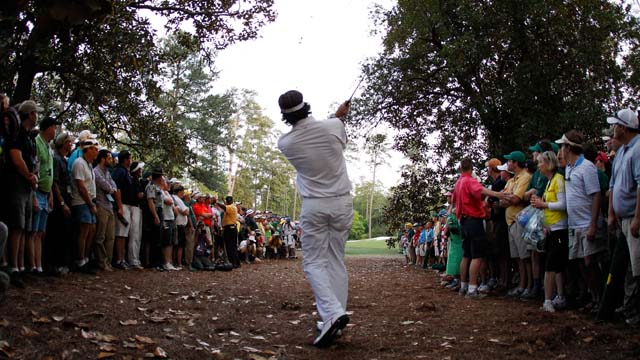NEWS
Eubanks: Always be true to your game

Bubba Watson felt perfectly comfortable in the trees, standing on pine straw with a giant magnolia between his ball and Augusta National’s 10th green. That was his comfort zone, a place where he knew exactly what to do.
"If I have to hit a hook around a tree, that’s a shot I know I’ve got, and there’s no pressure, because people don’t expect me to be able to pull that shot off," Bubba said. "It’s from the middle of the fairway, that’s pressure because everybody expects you to hit it close."
Hit it close is exactly what Watson did, a 52-degree wedge from 151 yards with 30 yards of hook and enough sidespin to roll uphill on Augusta’s famously hard greens.
As miraculous as the shot looked to everyone who saw it, Bubba spoke as if it was no more astonishing than filling up the gas tank in the General Lee. "I could have hooked it more if I’d needed to," he said. No one who has ever seen him play doubted that. Earlier in the week Bubba hit a 181-yard 9-iron that hooked 50 yards, and on the range he hooked and sliced wedges 30 and 40 yards with ease.
"That’s how I learned to play," he said. "At home in Bagdad (Fla.) I learned by hitting whiffle balls around trees and cars and curving them around the house." So when he faced what seemed to be an impossible task, he felt at home, unshackled from major championship pressure by the calming instincts of his childhood.
Seeing that shot and hearing Bubba’s ho-hum explanation reminded me of something Butch Harmon told me once as we were talking about why players leave one coach and go to another.
"Whatever you do well at age 12 is what you’re going to do well at 22, 32, 42, and 52," Harmon said. "But the opposite is true, too. Whatever you struggle with – whatever swing flaw you have when you learn the game – is what you’re going to have to work on for the rest of your life. A lot of guys have trouble accepting that. They change teachers because they get tired of hearing the same things over and over again."
But switching messengers doesn’t change the message. The parts of your game that came naturally when you first learned to play will continue to come as easily as walking to the fridge. And those swing flaws you’ve battled since you picked up your first club will still plague you, flaring up like a mutating virus for as long as you play the game.
I was reminded of this during a recent golf outing. After working for weeks on my swing I felt as though I finally had it. I had also practiced my short game during that time, but I’d hit twice as many drivers as putts. Still, when I got the course I struggled to hit it straight. I missed fairways left and right, and then banged shots somewhere near the green where I got up and down like mad.
"It’s crazy," I told a friend. "I practice my guts out and I still hit it all over the yard, but I feel like I should get it up and down from anywhere, and I usually do."
"Describe the golf course where you learned to play?" he said.
When I did, I realized his point. I learned the game on a public course with wide-open parallel fairways. You could miss your target 100 yards and still play, but the greens were the size of a living room rug and crowned like pitcher’s mounds. I became a golfer by hitting the ball hard, no matter where it went, and learning to be creative around the greens. No matter how much I try to shake that, I still struggle with my accuracy and have a short game that has earned me such nicknames a Pogo (up and down) and Wedgie Jackson.
"That’s how you play, because that’s how you learned," my friend said. "You can always get better, but if I were you, I’d just embrace who you are and go with it."
There is a life lesson there, one far older and more widespread than the game of golf. Shakespeare knew it – "This above all: to thine own self be true / And it must follow, as the night the day / Thou canst not then be false to any man:" Hamlet, Act 1.
On the other end of the spectrum, Judy Garland knew it to. "Always be a first-rate version of yourself instead of a second-rate version of somebody else," she said.
Golf is a game of character, rich with metaphors for life. But none is greater than this. To be your best, you have to know who you are, your strengths, your weaknesses, and your nature, good and bad. To succeed, you have to play to your strengths in golf and in life. While you can always improve those areas where you are deficient, it won’t be easy and there is no permanent cure. The battle will be ongoing, the demons suppressed but never fully conquered.
The sooner we learn that the better we will all be, not just as golfers, but as human beings.
